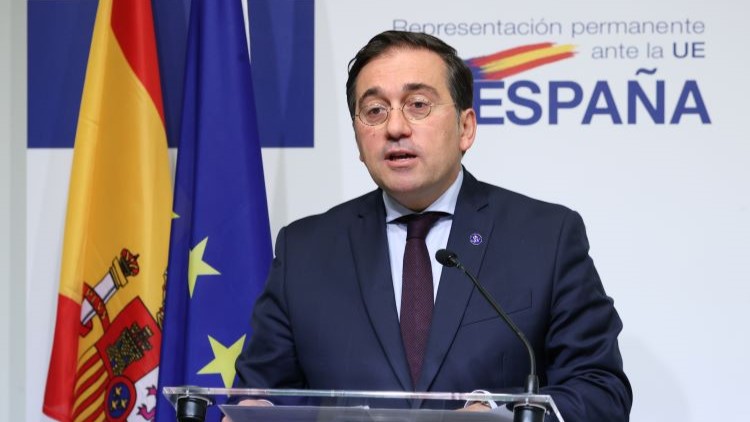Eduardo González
The acting Minister of Foreign Affairs, José Manuel Albares, presented yesterday at the EU General Affairs Council (GAC) a new adapted proposal of Spain for the change of the European linguistic regime and the officialization of Catalan, Basque and Galician within the European Union in order to try to avoid the announced veto of Latvia and Lithuania and to keep the debate alive for future meetings.
From the very beginning of the GAC, held in Luxembourg, Latvia and Lithuania were openly against the proposal, arguing that the change in the language regime would have a great “political impact” in their countries, where there is a significant Russian-speaking minority.
However, the two Baltic countries did not oppose the continuation of the debate at a technical level within the EU-27 after noting that about a dozen Member States were still willing to continue discussing the cost or the legal fit of the Spanish proposal “on the basis of a more detailed technical work”, EU sources told Europa Press agency. Finally, the General Affairs Council agreed yesterday to “remain seized of this matter” pending the Commission’s analysis of the economic implications of the Spanish request, “in cooperation with the other EU institutions”, and the presentation of a subsequent “adapted proposal”.
“Today (yesterday) we have made progress so that the Spanish proposal is the proposal of the 27,” Albares assured, with a very optimistic tone, during the press conference after the Council. “Today we have achieved that the inclusion of Catalan, Basque and Galician in the linguistic regime of the EU is closer,” he added.
The acting minister presented in Luxembourg an adapted Spanish proposal that includes “the observations raised by some Member States at the Council meeting last September 19” and that he himself has “been dealing bilaterally with many of them throughout this week”. “Of course they also respond to the comments made to us by the Baltic countries,” he said.
From these contacts, he explained, the adapted proposal establishes that “the proposed reform is limited exclusively to the case of Spain”, taking into account “the specificity of Spain due to the series of determining factors that Catalan, Basque and Galician meet and that make them a unique case in the EU”, and, therefore, that “other languages will not be able to benefit from this reform if the Member State does not wish to do so”.
Likewise, Albares informed that Spain has undertaken to assume the costs of translation and interpretation of the three languages in the EU. To that end, he assured, the Spanish Presidency of the EU Council requested “on Tuesday of last week budgetary and material impact reports from the Commission services.” “As soon as we receive the Commission’s evaluation, we will formalize what Spain has already indicated of assuming its financing,” he added.
“For almost two decades, we have had administrative arrangements financed entirely by Spain in practically all the European institutions for these three languages and no difficulty or problem has ever arisen in their financing,” he said. “Only the Commission can establish the exact cost, because it is the only one that knows exactly what the cost is, but, of course, the estimates we have are absolutely assumable by Spain,” he said.
“There are no vetoes”
“I am not going to discover the national positions of all the Member States, but I will say that no State has opposed the circulation of this adapted proposal” and even “several countries have explicitly expressed their support for our approaches,” Albares assured. “Let’s not forget that this decision has to be taken unanimously, and when we talk about unanimity, votes don’t matter, vetoes matter, and there are no vetoes,” he added. “We have concluded, without opposition from any member state, that this adapted proposal will be circulated through the usual channels,” he said.
“I have also indicated that the ease of finding translators and interpreters will make its introduction into the language regime very simple, given that they are not minority languages, but have a very large number of speakers,” Albares explained. “In the case of Catalan, for example, there are more than ten million, more than many languages that are now official in the EU,” he added.
Regarding the controversy that arose after the September CAG over Albares’ proposal to start with Catalan and do it later with the other two languages, the acting minister specified that the objective of that “gradual application” was to “facilitate the approval of the reform as soon as possible”, but he assured that “the reform is for the three languages on equal terms and with the same consequences for all three”. “In fact, today’s (yesterday’s) proposal is for all three languages,” he warned.






